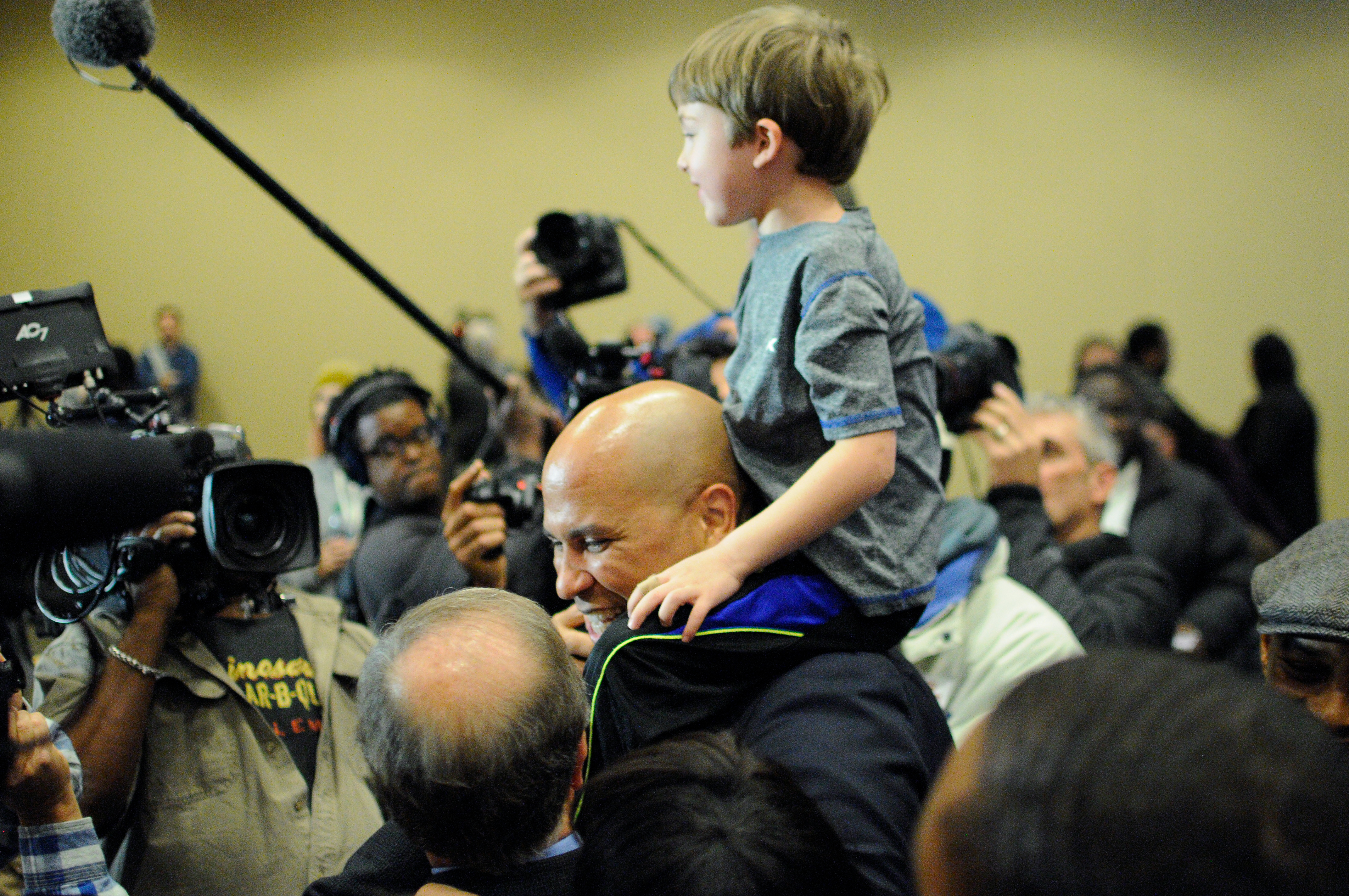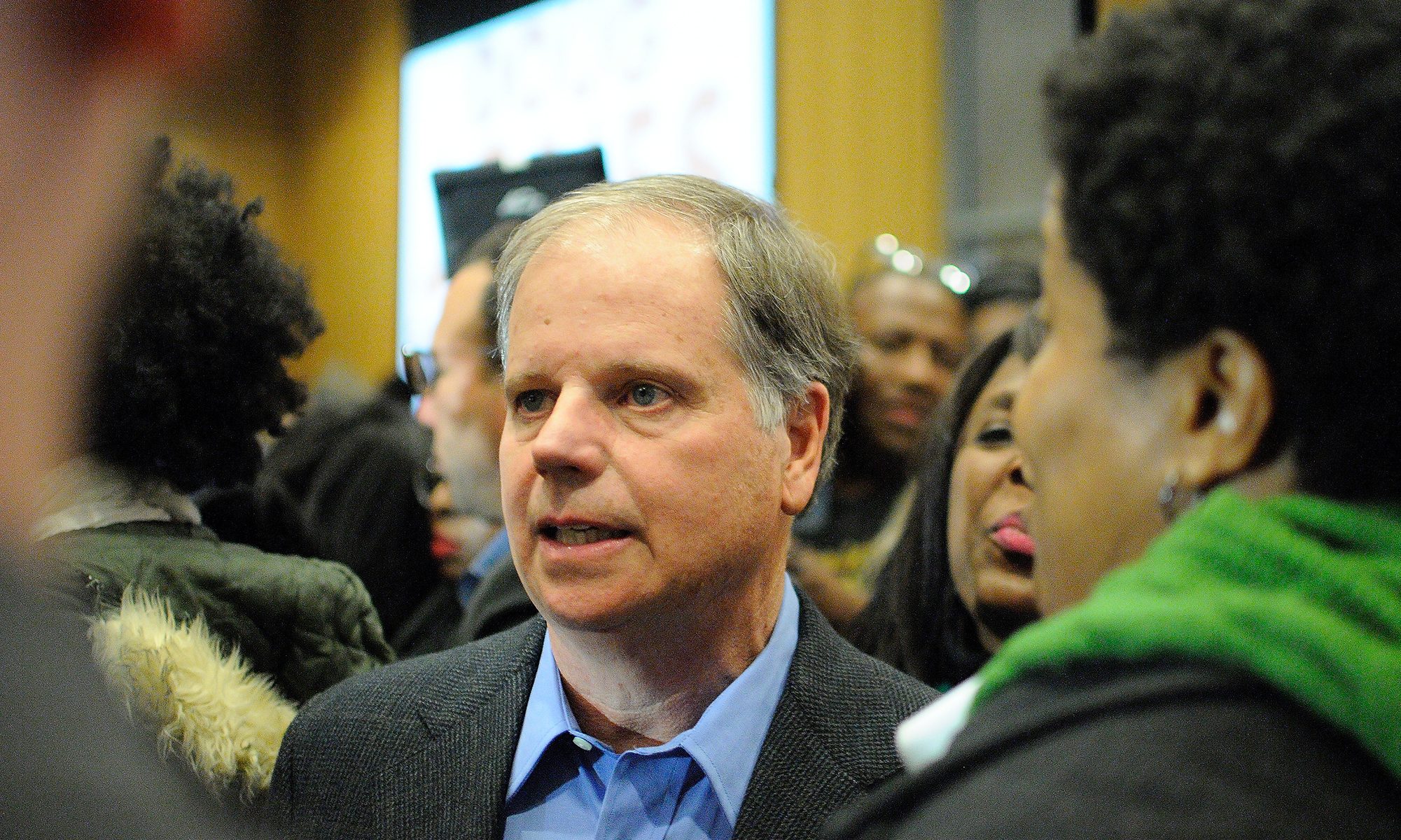MONTGOMERY, Ala. — Nicole Bennett, a 45-year-old Navy veteran, saw a man trekking down U.S. Highway 80 between Selma and Montgomery on Thursday, only a plastic bag and a beanie shielding him from a cold, persistent rain — a small flag in hand.
Bennett, thinking the man was a veteran, pulled over, rolled down her window and asked him if he needed a ride. He didn’t. Instead, to her surprise, he told her he was walking down Highway 80 — the route of the historic Selma to Montgomery marches — with a purpose. That purpose, he told her, was to get out the word about U.S. Senate candidate Doug Jones.
“This man is walking up Highway 80 in the freezing cold, in the rain, with his flag, and a Doug Jones poster,” Bennett said. “I got home, and I said, ‘I have to step up my game.'”
It’s motivated black voters like Bennett and her husband Derek who will need to turn out in high numbers for Jones if he is to pull off an upset in Tuesday’s special election. The Bennetts, both veterans themselves, attended one of four Jones campaign get-out-the-vote rallies Saturday, sitting in the third row of a rally in Alabama State University’s student center.
“I’ve never seen this amount of people going out, going door-to-door for a candidate,” Bennett said. “I haven’t seen anything like this in a long time.”
In the final days of the campaign, with polls bouncing back and forth between Jones and Republican candidate Roy Moore, Jones has launched a get-out-the-vote effort that’s unprecedented for a modern Democratic candidate in Alabama
Between a stop in Selma Saturday afternoon, the rally in Montgomery Saturday evening and two get-out-the-vote concerts in Birmingham and Huntsville Saturday night, Jones has continued to criss-cross the state in an effort to draw out support from black and millennial voters.

New Jersey Sen. Cory Booker greets Doug Jones supporters at a campaign GOTV rally on Saturday, Dec. 9, 2017.
Jones has brought in big names — including former Massachusets Gov. Deval Patrick, New Jersey Sen. Cory Booker, U.S. Rep. Terri Sewell, country music star Jason Isbell and soul band St. Paul & The Broken Bones — to add more electricity to the campaign, which has mostly been defined by his contrast with Moore.
Jones, a former U.S. attorney, has been painting himself as a moderate, reasonable alternative to Moore, a firebrand jurist who has for decades been a controversial, polarizing figure in Alabama. Combined with the recent sexual assault allegations and Moore’s tendency to underperform in statewide elections, having come less than 2 points away from losing in 2012, Democrats are hoping Jones can pull through. But they aren’t sure, in the final days, that mere contrast will be enough to buoy Jones’ candidacy.
Jones said his campaign is an opportunity for Alabama to “be on the right side of history” and “put its best foot forward.”
“People want somebody who can get something done and be an effective U.S. senator, not somebody who’s going to divide the house even further, and this time divided probably three ways because Moore can’t even get along with people in his own party much less the Democrats,” Jones said.
Even as Jones’ campaign continues its GOTV operations, the historic outlook for Democrats remains bleak. No Democrat has won a statewide race in Alabama since 2008, and Alabamians haven’t voted for a Democratic senator since 1992. And no matter how many black voters turnout, it might not be enough. Sixty-three percent of black voters turned out in 2012, the highest ever on record in Alabama, but President Barack Obama, facing re-election, still lost the state by more than 22 percentage points that year.
Despite the challenges, Jones is trying to balance his rhetoric and marshal an unusual coalition of black voters, millennials energized by the Trump presidency and cross-over Republican voters disaffected with Moore’s controversial candidacy. Democrats, in a state where they’re used to losing, are hoping this race is a firestorm of opportunity where their candidate can upset the Republican.
Moore, in the meantime, has avoided the spotlight in recent days while his campaign continues to attempt to push back against the allegations. His last public campaign appearance was at a rally Tuesday with former White House chief strategist Steve Bannon, and he isn’t expected to appear again at a public campaign event until Monday night when he will rally supporters with Bannon for a third time just a day before the election.
Booker and Patrick, two rising leaders of the national Democratic party, pointed to Jones’ record prosecuting two former Klansmen responsible for the 1963 16th Street Baptist Church Bombing as an example of Jones’ commitment to equality and civil rights.
“This is our time, Alabama. This is our time right now,” Booker said. “It’s our time to stand up for the unfinished business of America, to stand up for the people still struggling, to stand up for the folks without health care, to stand up and say we may not be there yet but through my labor, through my sweat, America will be.”
Booker and Patrick’s arrival on Saturday is a departure from the Jones campaign’s strategy of keeping national Democrats, whom they feared would do more harm than good, away from his candidacy, choosing to focus on Alabama-based surrogates instead. Booker will make another stop in Birmingham on Sunday as the campaign continues to make its final push, which accompanies an ad spending spree that has outpaced Moore 10 to one.
“Bad people get elected when good people don’t vote,” said Booker, whose family has roots in Alabama. Booker, earlier in the day, tweeted this criticism at Moore: “I am in the United States Senate & I don’t want to be next to you wondering if Senate Pages will be safe from your advances.”
Booker said Moore would be unable to work with other senators to help Alabama, echoing a similar refrain from Jones, who has said Moore would hurt Alabama’s business climate and pose a challenge for state officials who are hoping to recruit new industry to the state.
“He does not have the capacity to serve this state in the Senate,” Booker said. “He will not, will not be able to work with people, even in their own party, not to mention most things in the Senate, with some exceptions recently, but most things in the Senate, from infrastructure to education to health, necessitate your ability to work across the aisle and find uncommon coalitions, and this person has an inability to do that.”
Bennett, who now plans to volunteer on election day to drive people to the polls, said she was first drawn to Jones when she saw one of his first political ads. It struck a different tone for her, but she has been invigorated in recent weeks as the campaign has heated up.
“It has been more — instead of isolating and polarizing — for everybody, not just one set of people,” Bennett said of Jones’ campaign. “You cannot group people into categories and still speak for everybody. I want somebody that can listen to both sides and pull this country back together instead of it being this side or that side.”















































